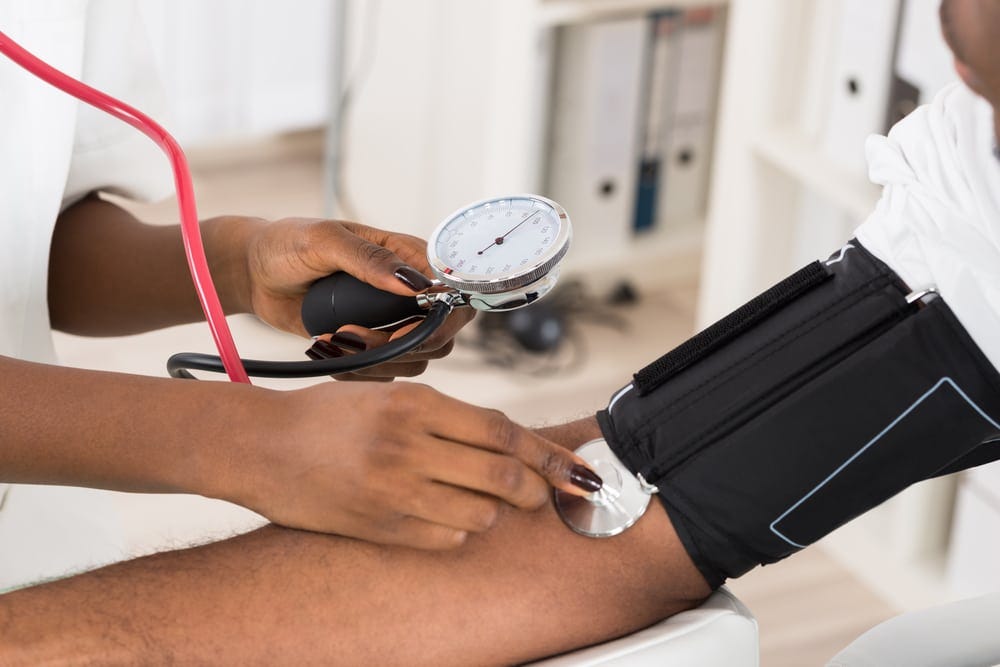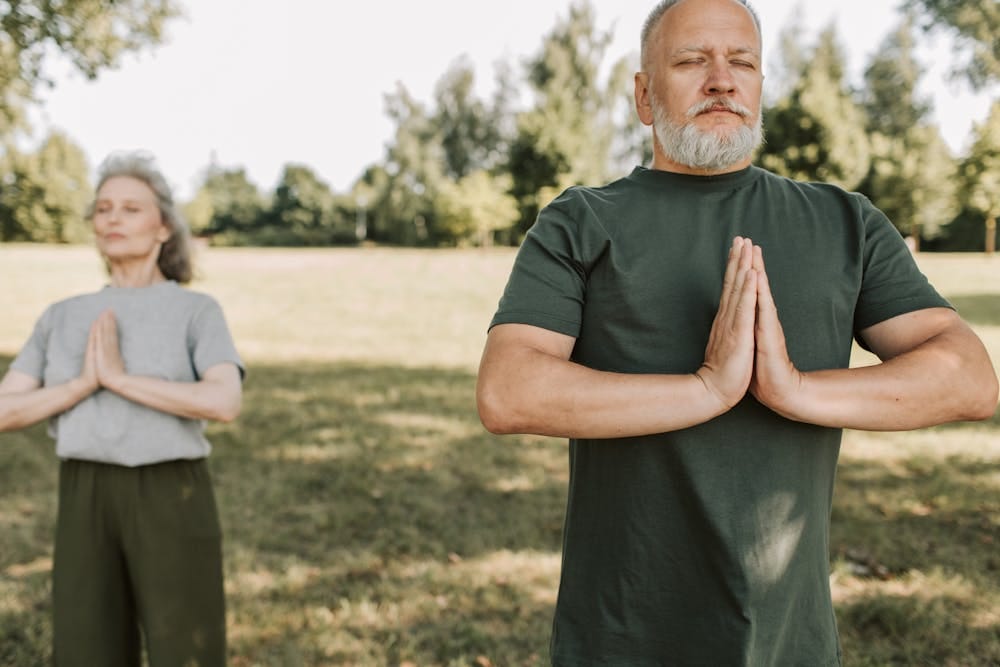Brief summaries of 28 research publications on the safety and positive impacts of yoga, meditation and breathing practices on heart disease & heart health.
Quick access to reams of research on heart health overall, plus specific impacts on high blood pressure, cardiovascular disease, and recovery from heart failure, heart attack, and stroke.
Meta-Analysis of Randomized Control Trials: Yoga’s Impact on Factors Related to Cardiovascular Disease and Metabolic Syndrome
Compared to non-exercise controls, yoga showed significant improvement for body mass index, systolic blood pressure… body weight, blood pressure, total cholesterol, triglycerides, and heart rate.
European Journal of Preventive Cardiology and Sage Journals
Randomized Control Trial: Yoga's Impact on People Who’ve Had a Heart Attack
Autonomic dysfunction is an independent predictor of cardiovascular and all-cause mortality after [heart attack]… This short-term yoga-based cardiac rehabilitation program had additive effects in shifting sympathovagal balance toward parasympathetic predominance while increasing overall HRV.
Contents
Research Summaries: Introduction
Heart Health, Generally
Hypertension (High Blood Pressure)
Cardiovascular Disease
Heart Failure, Stroke
Resources
Recent Newsletters
Research Summaries: Introduction
It can be frustrating and time-consuming to track down research, evaluate the reliability and context, wade through technical language, summarize key points and, finally, figure out how you can communicate and apply what you’ve learned.
We’ve worked hard so that you can be more efficient in using research. Our research summaries offer:
Research organized by subject matter.
The title of each research study is a succinct statement of the results, so that you can get a quick sense for the study’s significance. Also in the title is the year of the study.
The brief, bullet-point synopsis for each research study includes the research protocol. (When it’s a controlled trial, that is included in the title.)
Key points and significance of the findings.
Quick links for verification and further review. Includes links to the original published research, plus articles referring to research (which often have more concise and clear statements on the significance of the research).
Here you’ll find summary statements for 28 studies on heart health. You’ll also find a full research summary for one of the studies in each category; the rest are here, organized with jump-to links for ease of navigation.
Heart Health, Generally
Effective for cardiovascular health and reduced BMI (2014)
Positively affected physiological measures of stress including cortisol, blood pressure, heart rate, heart rate variability, fasting blood glucose, and cholesterol (2017)
Improvements in multiple cardiovascular disease risk factors, including blood pressure, respiratory rate, waist circumference, waist/hip ratio, cholesterol, triglycerides, and insulin resistance (2014)
Meditation associated with lower prevalence of heart disease and risk factors for heart disease (2020)
In cancer patients undergoing chemotherapy, improved resting heart rate and HRV, thereby providing protective effects against cardiac ANS (a predictor of heart attack and death) (2023)
Regulated nervous system and reduced heart rate, blood pressure, irregular heartbeat, stress, anger, depression, and anxiety (2017)
Beneficial effects on systemic inflammation, stress, the cardiac ANS, and cardiovascular risk factors (2019)
Favorable impact among older adults on blood pressure, body composition, glucose, and lipids (2015)
Even among novice meditators, meditation produced brain wave changes, plus a small reduction in blood pressure among those without blood pressure issues (2015)
Vinyasa yoga for sedentary college students: significant physical and heart-health benefits, improved psychological well-being, and lower stress levels (2018)
Meta-analysis of 42 randomized control trials (RCTs): Positively affected physiological measures of stress including cortisol, blood pressure, heart rate, heart rate variability, fasting blood glucose, and cholesterol (2017)
Meta-analysis of 42 randomised controlled trials (RCTs)
Compared stress-related physiological measures of yoga asana intervention, with and without mindfulness-based stress reduction, to an active control
Focused on studies that measured physiological parameters such as blood pressure, heart rate, cortisol and peripheral cytokine expression
“Interventions that included yoga asanas were associated with reduced evening cortisol, waking cortisol, ambulatory systolic blood pressure, resting heart rate, high frequency heart rate variability, fasting blood glucose, cholesterol and low density lipoprotein, compared to active control.”
“Practices that include yoga asanas appear to be associated with improved regulation of the sympathetic nervous system and hypothalamic-pituitary-adrenal system in various populations.”
Research – Yoga, Mindfulness-Based Stress Reduction And Stress-Related Physiological Measures: A Meta-Analysis link
Hypertension (High Blood Pressure)
Reduced blood pressure in overweight adults who had high blood pressure (2019)
Reduced risk in those with mild to moderate hypertension (2002)
Alternate nostril breathing “significantly decreased” blood pressure (2017)
Alternate nostril breathing reduced blood pressure and improved performance that required hand-eye coordination & focus (2014)
Improved balance, regulated blood pressure & improved cardiovascular health (2014)
Significantly more effective than “general relaxation” in reducing blood pressure in hypertensive patients (1975)
Reduced atrial fibrillation (irregular heartbeat), decreased heart rate and blood pressure, and made a positive impact on quality of life, mental health and physical functioning (2015)
Alternate nostril breathing reduced blood pressure & improved performance that required hand-eye coordination & focus (2014)
41 healthy male participants: 26 in intervention, 15 control
Intervention: 15 min of alternative nostril breathing in a 25 min session; control group sat quietly for 25 minutes
Assessed (1) heart rate variability, (2) non-invasive arterial BP, and (3) respiration rate
“Effectively decreased blood pressure and improved performance of skilled motor tasks requiring hand-eye coordination, repetitive motor activity, and focused attention.”
“The results suggest that vagal activity increased during and after ANYB, which could have contributed to the decrease in BP and changes in the HRV [heart rate variability].”
Research – Blood Pressure And Heart Rate Variability During Yoga-Based Alternate Nostril Breathing Practice And Breath Awareness link and Yoga and Breathing: Study Shows Alternate Nostril Breathing Reduces Blood Pressure and Improves Performance link
Cardiovascular Disease
Yoga lifestyle reversed severe coronary artery disease (2000)
MBSR meditation alleviated symptoms “both mental and physical” among people with cardiovascular disease and other chronic conditions (2015)
Reduced cardiovascular events and mortality;”favorable effects on systemic inflammation, stress, the cardiac autonomic nervous system, and traditional and emerging cardiovascular risk factors” (2019)
Halted and reversed heart disease, reduced cardiovascular events, and prevented irregular heartbeat (2014)
Randomized control trial (RCT): Yoga lifestyle reversed severe coronary artery disease (2000)
42 men with coronary artery disease, (clogged arteries), diagnosed via angiogram (an X-ray that shows blood flow)
RCT: 21 participants randomized to an intervention group, and 21 to a control group; followed for one year
Intervention group: “user-friendly program consisting of yoga, control of risk factors, diet control and moderate aerobic exercise”
Control group: “managed by conventional methods i.e. risk factor control and American Heart Association step I diet”
“Yoga lifestyle intervention retards progression and increases regression of coronary atherosclerosis in patients with severe coronary artery disease.” It also improves symptoms and risk factors.
Research – Retardation Of Coronary Atherosclerosis With Yoga Lifestyle Intervention link
Heart Failure, Stroke
Individualized yoga is safe and effective for heart failure patients in quality of life outcomes (2018)
Heart failure patients: no adverse events & experienced improved physical function (2010)
Post-heart attack patients in yoga-based cardiac rehab improved nervous system functioning and HRV compared to standard care (2019)
Significantly improved memory among post-stroke group (2019)
Among people in stroke rehabilitation, yoga improved memory, motor functioning and quality of life (2020)
Mindfulness exercises are effective in improving sensorimotor function of lower and upper limbs in poststroke patients (2018)
Improved quality of life for people with neurological disorders and stroke rehabilitation: Improved balance, strength, mobility, mood; reduced pain and tremors, and more (2017)
Randomized control trial: Post-heart attack patients in yoga-based cardiac rehab improved nervous system functioning and HRV compared to standard care (2019)
80 patients post-myocardial infarction (heart attack)
Randomized control trial with 12-week yoga-based cardiac rehabilitation program
Yoga group received 13 hospital-based structured yoga sessions as an adjunct to standard care; control group participants received enhanced standard care involving three brief educational sessions with a leaflet on the importance of diet and physical activity
“Autonomic dysfunction is an independent predictor of cardiovascular and all-cause mortality after myocardial infarction… This short-term yoga-based cardiac rehabilitation program had additive effects in shifting sympathovagal balance toward parasympathetic predominance while increasing overall HRV.”
Research – Effect of Yoga-Based Cardiac Rehabilitation on Heart Rate Variability: Randomized Controlled Trial in Patients Post-MI link
Heart Rate Variability (HRV) — The change in length of time between heartbeats, an indicator of parasympathetic nervous system functioning, “a physiological measure of emotional stress” (Dr. Stephen Sinatra MD)
Resources
The article above is an excerpt from WellnessResourceCenter.net (home of YogaTeacherCentral.com) where we consult hundreds of reference materials for each subject and organize the invaluable knowledge into more than 500 “lessons” — each organized with jump-to links for quickly getting to just what you need.
Hypertension / High Blood Pressure — Diagnostic criteria, root causes and conditions, and research showing effective techniques for reversing high blood pressure, including breathing practices, movement, yoga, and nutritional therapies.
Cardiovascular Disease & Circulation Issues — Terminology and underlying causes and conditions related to cardiovascular disease and circulatory issues.
Heart Health Techniques — Research and considerations related to the impact of nutritional therapies and other lifestyle factors, drugs, surgery and stents on cardiovascular disease and heart health.
Heart Health & Yoga — Research, contraindications, and considerations related to teaching yoga for heart health.
Recent Newsletters
Timely
Timely Considerations — June 2025 link
Yoga
Research on Yoga's Impact on Heart Health — Brief summaries of 28 research publications on the safety and positive impacts of yoga, meditation and breathing practices on heart disease & heart health. link
Energy Philosophy — Why Do We Have Energy? Where Does it Come From? Subtle Energy from a Yoga Perspective. link
Asana Benefit — Teaching the verifiable benefits of yoga poses to reduce stress, increase concentration, reduce chronic pain and inflammation, and much more. link
Yoga for Heart Health — Arrhythmia, AFib (Irregular Heartbeat), Heart Health & Yoga link
Health & Wellness
Vitamin D — Vitamin D’s functions are so foundational and essential as to be virtually indistinguishable from bodily functioning as a whole. Get the key facts here and get your un-sunscreened skin in the sun. link
Toxins & Detoxing — Establishment doctors weren't taught about toxins or detoxing. We need to educate ourselves and our clients, so that we're all making informed choices. link
For more: Newsletter Archive









